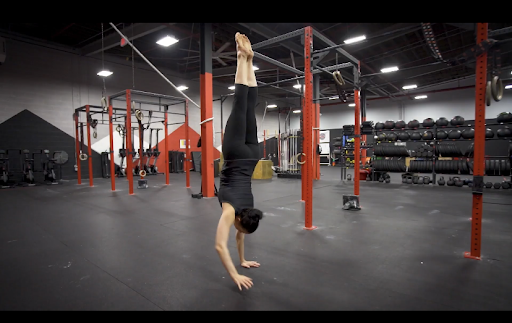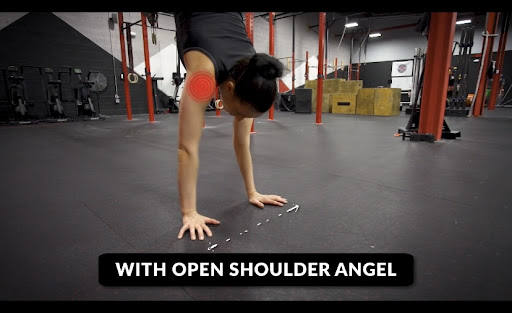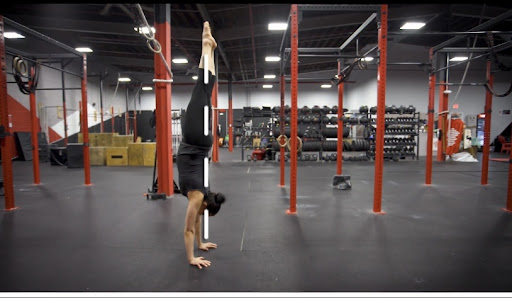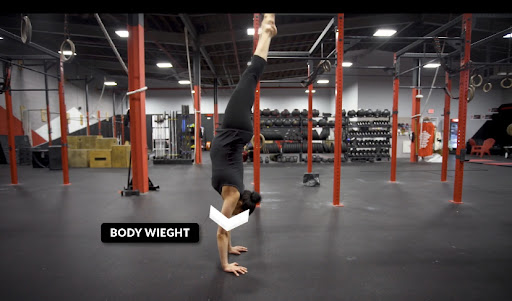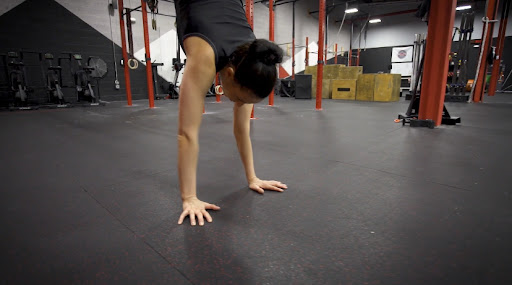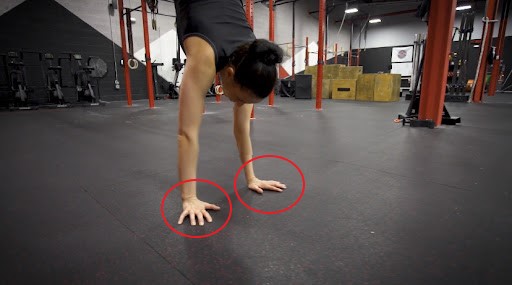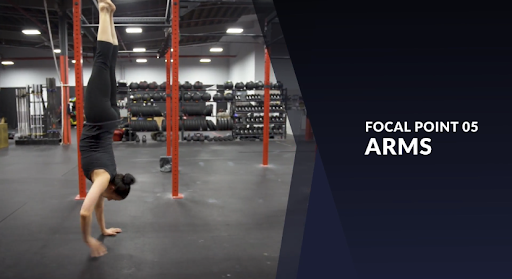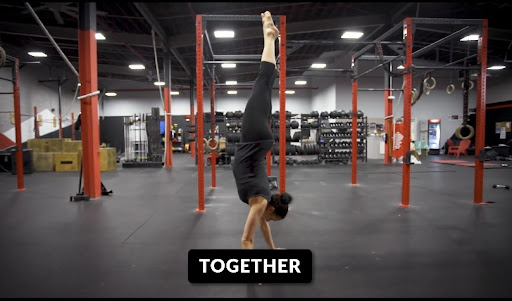Are you up for a gravity-defying adventure that’ll flip your perspective on movement?
If you’ve mastered the static handstand and are eager to explore new dimensions of body control and movement, the perfect forward handstand walk might be your next challenge.🎯
Picture this: effortlessly gliding forward on your hands, feet elegantly poised in mid-air, and a grin that says, ‘Yes, I’ve mastered the art of walking on my hands!’ The perfect handstand walk isn’t just a physical feat; it’s a symphony of balance, strength, and sheer audacity that leaves onlookers both amazed and envious.
But what exactly goes into crafting the quintessential handstand walk? Is it about maintaining impeccable form, defying the laws of equilibrium, or maybe a dash of magical flair?🤔
👊In this guide, we will delve into the intricacies of this impressive skill and break down the key components that contribute to its perfection.
🤸Overview of the Handstand Walk
A handstand walk is exactly what it sounds like—a walk performed on your hands while maintaining an inverted position.
This awe-inspiring feat not only demands core strength, shoulder stability, and wrist flexibility, but also an intricate sense of balance and coordination. While it might appear reserved for the circus arena or gymnastics competitions, the handstand walk has found its place in the dynamic landscape of calisthenics, captivating both beginners and seasoned practitioners.
✨Key Components of Perfect Handstand Walk
So, if you have a stable handstand, the handstand walk could be your next step. Our handstand walking requires a 10-second static handstand away from the wall in free space.
You must also know how to bail safely because you will be falling as you walk in different directions. So you will need to know how to do a handstand forward roll, as well as pirouette or cartwheel out of it. This will prevent you from injuring yourself.
Here are the six key components of perfect handstand walk:
1. 🔥Controlled Entry and Alignment
A successful forward handstand walk begins with a controlled entry into the handstand position. Achieving an open shoulder angle and maintaining a tight, straight body are fundamental. This initial alignment sets the stage for a stable and controlled movement sequence.
2. 🔥Weight Transfer
As you walk forward on your hands, transferring your weight effectively becomes paramount. To initiate forward movement, you must shift your weight over your hands, essentially tipping your body slightly in front of them. This weight transfer is the foundation upon which the entire walk rests.
3. 🔥Precise Hand Placements
Gone are the days of sporadic hand movements. Mimicking the purposeful steps we take while walking on our feet, deliberate and consistent hand placements are crucial. This controlled approach ensures balance and stability throughout the walk.
4. 🔥Finger Engagement and Positioning
Just as we keep our feet aligned while walking, the fingers should face forward during a handstand walk. This engagement of the fingers mimics the way we naturally distribute weight through our feet, enhancing stability and control.
5. 🔥Dynamic Arm Movements
During a handstand, it’s essential to maintain locked arms for stability. As you position your hands and raise your elbows while subsequently bending and lowering them to the floor, a slight degree of flexion is natural.
Drawing a parallel to walking, consider that you don’t fully extend you knees without any flexion during your strides. Similarly, in a handstand, there’s a rhythm of bending, lifting, and then straightening as you establish contact and prepare for the subsequent movement. This cyclic motion aligns handstand dynamics with the nuanced mechanics of walking.
6. 🔥Engaged and Straight Legs
It’s crucial to ensure that your legs are aligned, maintaining a straight and cohesive form instead of being spread out, bent, or lax. By actively involving both your quadriceps and adductors, in addition to engaging your glutes, you’ll establish a strong foundation during your handstand walk. This mindful approach to coordinating your leg muscles will greatly contribute to your overall technique.
You can watch the full video here:
💪The Muscles at Work
Engaging in a handstand walk activates a symphony of muscles. Your wrist flexors and extensors, triceps, deltoids, trapezius, and core all come into play.
Unlike static handstands, where stability is key, a handstand walk demands more from your core muscles due to the dynamic nature of the movement.
🏆Benefits of Handstand Walking
More than just the adrenaline rush of defying gravity, there are many other physical and mental advantages to learning this trick. Some of the benefits of handstand walking are:
1. 🎯 Shoulder and Wrist Strength
Shifting your weight from one arm to the other enhances shoulder and wrist strength, a step up from the two-arm static handstand.
2. 🎯 Body Awareness
Mastering the forward handstand walk hones your ability to shift your body weight while upside down, promoting body awareness and control.
3. 🎯 Coordination and Stability
The controlled movements required during the walk improve your overall coordination and stability, benefiting your entire movement practice.
⏳Timeframe for Mastery
If you already possess a solid 10-second static handstand, you’re well on your way. Achieving a 20-foot handstand walk can take anywhere from one to two months, provided you commit to consistent practice.
However, progress varies based on individual starting points and training intensity.
🧐Frequently Asked Questions:
🔎Can I learn handstand walking without prior handstand experience?
It’s recommended to have a 10-second static handstand hold as a prerequisite. Developing basic handstand skills lays the foundation for the balance, alignment, and weight shifting necessary for handstand walking.
🔎How can I improve my balance during a handstand walk?
Focus on controlled weight transfers, engage your core, and maintain a straight body line. Practicing against a wall initially can build confidence and balance, gradually progressing to free space as you become more comfortable.
🔎What if I struggle with handstand walking on my fingertips?
Finger engagement is vital, but avoid excessive strain. Practice wrist and finger mobility exercises to improve flexibility. Start with shorter walks and gradually increase the distance as your finger strength improves.
🔎How do I prevent falling while handstand walking?
Learning safe bail techniques is crucial. Master forward rolls, pirouettes, or cartwheels out of the handstand position. This ensures you’re prepared to land safely if your balance is lost during the walk.
🔎Can handstand walking help with overall flexibility?
Yes! Handstand walking demands flexibility in the wrists, shoulders, and even hip flexors. Regular practice can contribute to improved flexibility and mobility in these areas over time.
🔎What should I focus on to achieve a fluid handstand walk?
Prioritize controlled movement over speed. Pay attention to weight shifts, aligned hand and finger placements, coordinated arm movements, an engaged core, and straight legs. Smooth transitions between steps create a fluid walk.
🔎How can I practice handstand walking progression?
Begin with plank variations that emphasize weight shifting. Gradually increase difficulty with exercises like wall-assisted walks and pike walks. Work on balance, body awareness, and gradually reduce wall support.
💥Conclusion
The perfect forward handstand walk combines strength, balance, coordination, and determination.💯 As you unlock this advanced skill, you’ll not only elevate your movement repertoire but also gain a deeper understanding of your body’s capabilities.
So, whether you’re an aspiring gymnast or a movement enthusiast, take on the challenge and embark on the journey towards mastering the perfect forward handstand walk.
🌟Do you want a customized calisthenics plan to help you reach your goal? Check out the The Movement Athlete Academy. It gives you access to world-class personalized calisthenics coaching.
TAKE THE ASSESSMENT NOW 💪 and get a detailed, personalized training plan, including recommendations for workouts that you can use right away.

